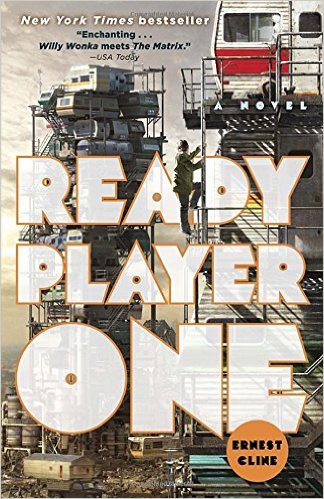Genre: Fiction, Dystopian Fiction, Science Fiction, Young Adult
Image via: Amazon
Yes, I realize this book is more than five years old, but I was a little slow on the uptake, and I’d like to argue that what makes it so dang appealing is its relevance to the world right now. What do I mean by that? Virtual Reality (or VR) is currently the hot new thing, in case you weren’t bombarded by Samsung’s VR commercials all Christmas long, and for good reason—if you haven’t yet, befriend somebody with VR goggles and a playstation or other VR-functional console, and you’ll see what I mean soon enough. Today’s VR technology provides us with what seems like an entirely new world contained in a pair of goggles, and it’s not at all difficult to make the leap between today’s VR systems and Ernest Cline’s complex virtual society (the OASIS).
The novel follows Wade Watts, a sad, lonely teenager who spends nearly all of his time logged into the OASIS (including school, which I think is a very real possibility for our future education models). Strapped for (real) cash, he can’t do much to explore the virtual worlds, but all of that changes when he (and the billions of other OASIS users) begins to search for an easter egg in the OASIS, planted by its now-deceased founder. The prize for its discovery? Oh, just the bajillions of bucks and the keys to the corporation that owns the OASIS. No biggie. Obviously that type of money means lots of competition, lots of drama, the potential for life-or-death situations, and so forth.
Long story short, it’s a fun read, and for the most part, it’s pretty easy to get sucked into the drama as people virtually race to compete for the prize. I’m also very appreciative of the dystopia that Ernest Cline created—sure, it has its own problems (poverty, starvation, etc.), but unlike many other dystopian novels of recent years, the books’ characters aren’t a bunch of gun-wielding cannibals wandering through cities. Instead, Cline presents a not-too-distant future that seems entirely plausible, one in which the virtual world becomes an escape upon which we rely more and more heavily.
Granted, there are some weak points in the novel. Some parts are a little too neat, in my opinion (particularly when–SPOILER ALERT-Wade goes from a nerdy, overweight teenager to a crazy intense guy with a shaved head and a six-pack. But whatever). At times, the novel feels less like a story and more like a platform for Ernest Cline to share his alarmingly immense library of ’80s knowledge/geeky references. Additionally, the whole romantic plot between Wade and his online crush is every bit as cliché as you’d expect. So why keep reading? I just love the OASIS and Cline’s ability to imagine an all-too-real future. If you’re willing to overlook the hackneyed bits and pieces—and the pages upon pages of ’80s references—it’s a fun ride, and it’s well worth your time. Not to mention, you need to read it before you see its film adaptation, which hits screens in 2018!
Verdict: Lit
